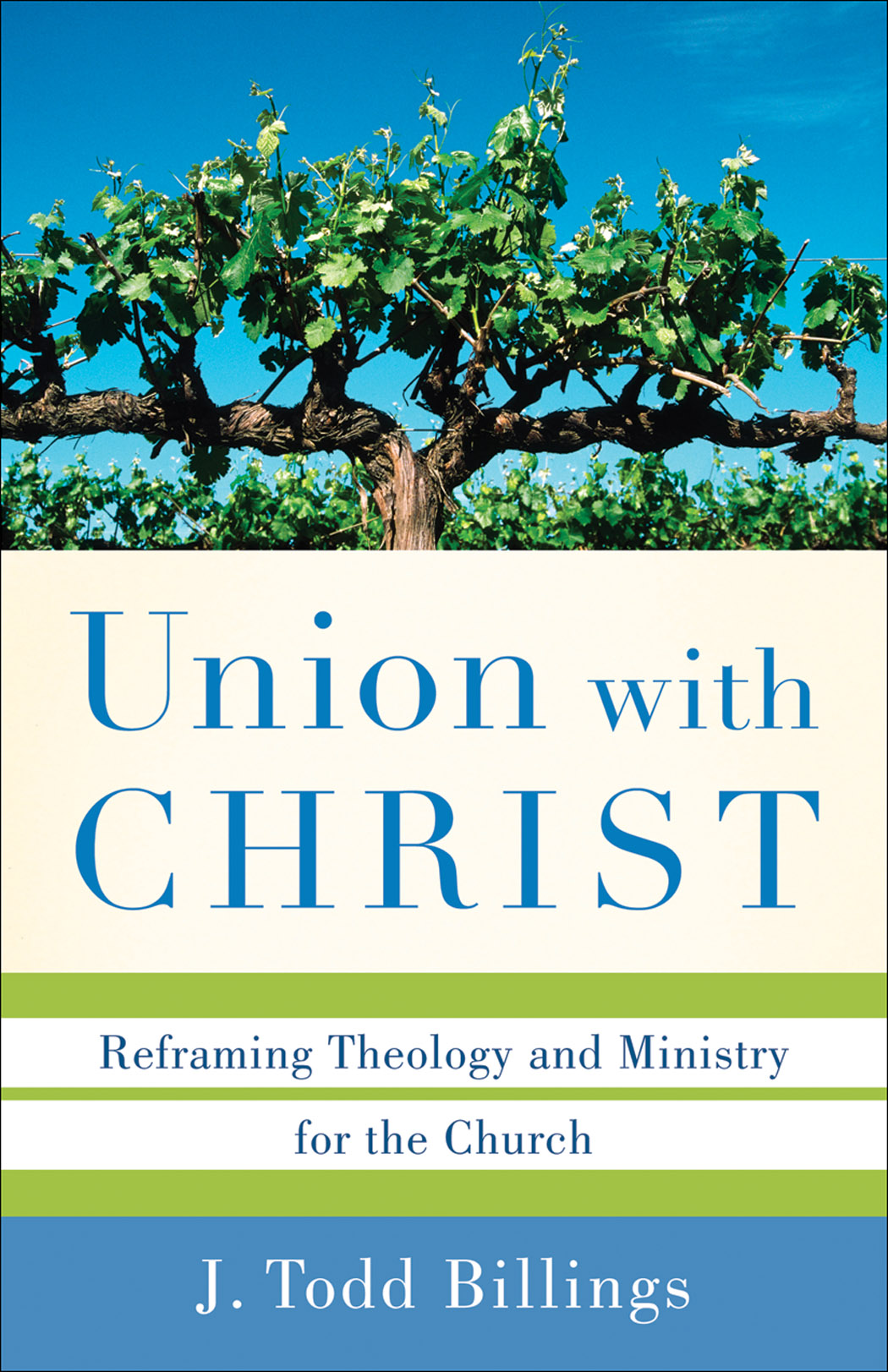Don’t be dismayed by such a broad title as Union with Christ: Reframing Theology and Ministry for the Church: J. Todd Billings, associate professor of Reformed theology at Western Theological Seminary, precisely explains throughout his book what he means by “union with Christ.” But if you’re investigating where he lands on the justification debate, Billings will leave you hanging. He states from the outset that he does not intend to contribute to the more soteriological debates surrounding this topic. Instead he picks a few issues that he feels can be helpfully explained through the lens of our union with Christ.
There is a natural flow to the topics Billings chooses to address: spiritual adoption, total depravity, communion with God, justice, and the “incarnational” ministry model. Billings calls on his readers to join him in some heavy theological lifting, but he manages to communicate accessibly for average, patient readers. And for those who bristle at the thought of theological depth and want to hear more about practical and tangible implications, Billings makes this comment: “Union with Christ is theological shorthand for the gospel itself—a key image that pulls together numerous motifs in the biblical witness.” He continues by quoting another author: “Being ‘in Christ’ is the essence of Christian proclamation and experience” (1). Is this hyperbole and overstatement to drum up initial motivation for the reader to keep reading? The rest of the book decisively answers no. Preachers and teachers, don’t miss what Billings claims: If union with Christ is missing from your definition of the gospel and its proclamation, you miss the heart of the Christian message.
How can Billings make such a high-stakes claim? He makes it clear that he is not the first to say these things. In post-Reformation theology, union with Christ was central in the theology of figures such as Caspar Olevian, John Calvin, John Owen, and many others. The doctrine is also systemic; it informs every other belief.
Billings combines what you would hope for in a theological work—biblical passages that provide the foundation for his points, supplemental quotes and analogies that provide clarification, all expressed in a personable style that is easy to follow. He chooses first to tackle one of the most neglected topics in theological discourse—spiritual adoption. “Through the Spirit, we can be united to Jesus Christ, becoming daughters and sons of God through our union with the one perfect Son of God” (16). In the same way that justification is a change in legal, forensic status (from guilty to imputed acquittal), so adoption is a change in status from belonging to one family in Adam to being in another family by virtue of our union with Christ. This notion of union with Christ and our closeness with the Son is a much more robust and personal notion of the gospel than a courtroom change of status. Calvin affirms the same: “Christ, having been made ours, makes us sharers with him in the gifts with which he has been endowed” (quoted on p. 27). Those gifts, among others, are justification, sanctification, and adoption, which are all distinct, inseparable, and simultaneous gifts given to us by virtue of our union with the risen Christ.

Union with Christ: Reframing Theology and Ministry for the Church
J. Todd Billings
Union with Christ: Reframing Theology and Ministry for the Church
J. Todd Billings
Accomplished theologian J. Todd Billings recovers the biblical theme of union with Christ for today’s church, making a fresh contribution to the theological discussion with important applications for theology and ministry. Drawing on Scripture and the thought of figures such as Augustine, Calvin, Bavinck, and Barth, Billings shows how a theology of union with Christ can change the way believers approach worship, justice, mission, and the Christian life. He illuminates how union with Christ can change the theological conversation about thorny topics such as total depravity and the mystery of God.
I need to emphasize again that Billings plunges deep theological waters. His discussion of divine and human agency prepares the way for exploring our participation in God and the image of God in us, using Calvin again as a springboard. While it is crucial for Billings to maintain the Creator/creature distinction at every point, he does want to flesh out what it means to be in union and communion with God and how that informs what it means to be properly and fully human. He expresses it this way: “to be fully human is to be united to God, and although sin seeks autonomy from God, there is still a trace of this union with or participation in God in all humanity” (44). You can guess where Billings goes next—in order for the sinful person to have full and proper communion and union with God, one must have that union by means of being united to the person of Christ. In that union we are not only united to our spiritual brothers and sisters in Christ, but because of Christ we are together united to our Father. This robust way of thinking about the gospel goes far beyond the 20th century construction of TULIP and necessarily includes a full doctrine of God, doctrine of man, doctrine of Christ, and doctrine of the Holy Spirit that includes the previously mentioned benefits of our union with Christ (justification, sanctification, and adoption). “Total depravity is a way to affirm that redemption involves nothing less than total communion with God in Christ” (61).
Once these somewhat technical yet immensely practical discussions are explored, Billings elaborates on another important answer to the question of how a transcendent, wholly other, incomprehensible God relates to his creation: accommodation and covenantal condescension. The concept of God accommodating to us goes both ways; we can never know God as he knows himself because of who he is, but we can have full confidence that God, given his character, accommodates in a way that still expresses the truth about himself and his creation. As we receive that accommodated knowledge, we recognize it is partial, incomplete, and weak because of our human weakness. One of his many implications and applications of this important truth bears mentioning here. He properly and helpfully frames theological “contextualization” in a way that addresses the modern need for accommodating the gospel message.
These trends reflect a theology of accommodation that focuses heavily on making the gospel “relevant” to today’s culture. But they often miss the point that accommodation is not so much a human act as a divine act. The gospel is understood and lived differently in various cultures. But this is not simply through a human act of “synthesizing the gospel with culture.” Rather . . . it is due to the Spirit’s work of “indigenization,” that is, the Spirit making God’s word understandable in various cultural contexts (92).
I wish I could elaborate on much more from this book: the treatment of moralistic therapeutic deism (MTD) and how a doctrine of union with Christ informs an answer to MTD; what it means to be “progressive”; the exegetical basis for many of the points he argues (including those mentioned above); the sociological insights developed and applied from Christian Smith’s work; a treatment of Herman Bavinck and the importance of mystery and covenant; archetypal and ectypal knowledge; the list could go on.
I hope it’s clear that this book should be reckoned with, especially by those who have had limited exposure to the importance of the doctrine of union with Christ for the gospel. As books like this and Robert Letham’s Union With Christ start to come out, Billings has ably carved himself a well-earned place in the ongoing discussions.



































